Personal and Professional Development: A Self-Managed Learning Report
VerifiedAdded on 2020/02/05
|10
|2188
|92
Report
AI Summary
This report delves into the realm of personal and professional development, exploring the application of the Honey and Mumford learning theory to identify the author's preferred learning style, which is determined to be reflector. It examines the benefits of self-managed learning for both the individual and the organization, highlighting the importance of continuous skill enhancement in the competitive business landscape, especially within the hospitality industry. The report outlines various approaches to self-managed learning, such as seminars and conferences, and emphasizes the need for lifelong learning through strategies like communication skill development. Furthermore, it presents a SWOT analysis to evaluate strengths, weaknesses, opportunities, and threats, followed by a Professional Development Plan (PDP) detailing activities for improving time management, conflict resolution, and presentation skills. The report concludes by referencing relevant literature on self-managed learning and professional development.
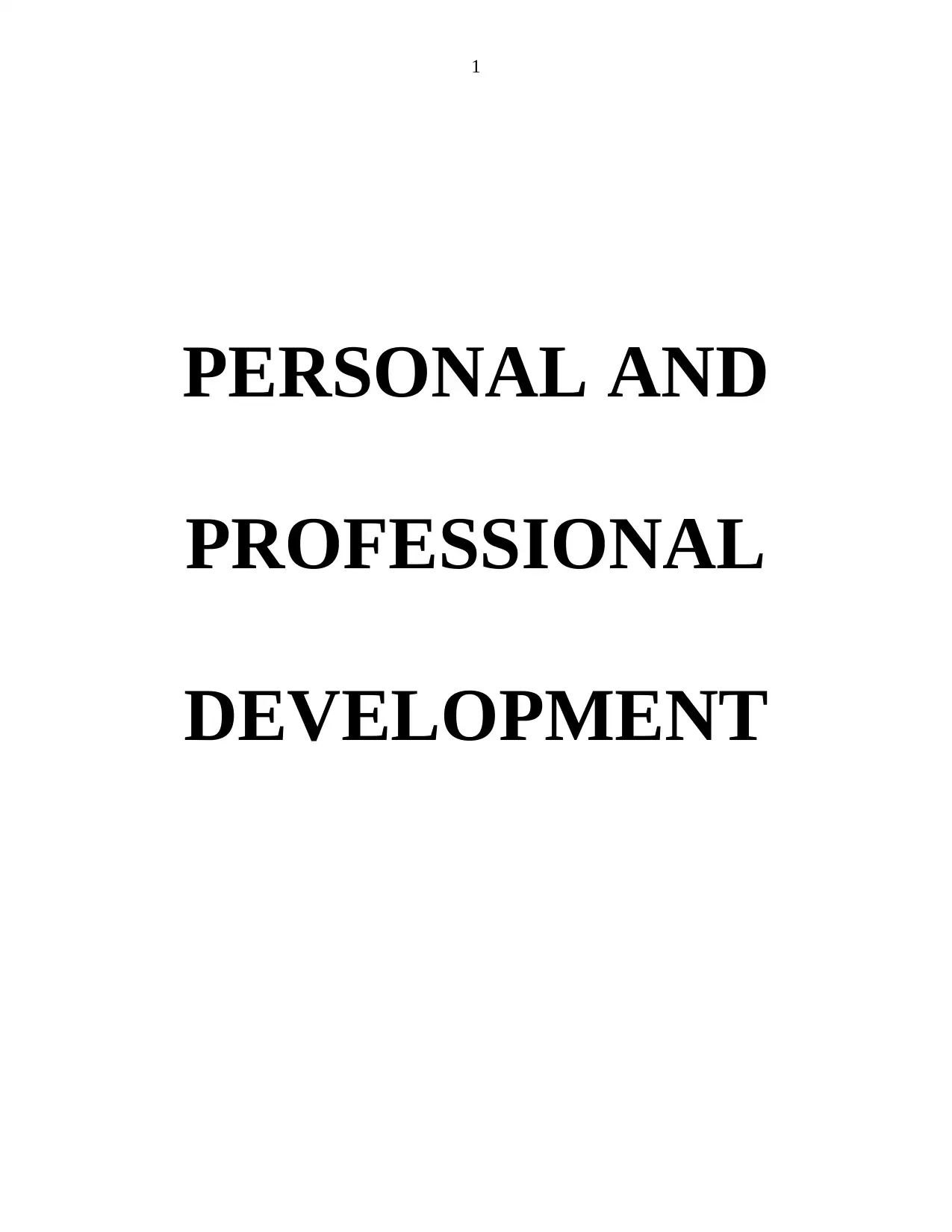
1
PERSONAL AND
PROFESSIONAL
DEVELOPMENT
PERSONAL AND
PROFESSIONAL
DEVELOPMENT
Paraphrase This Document
Need a fresh take? Get an instant paraphrase of this document with our AI Paraphraser
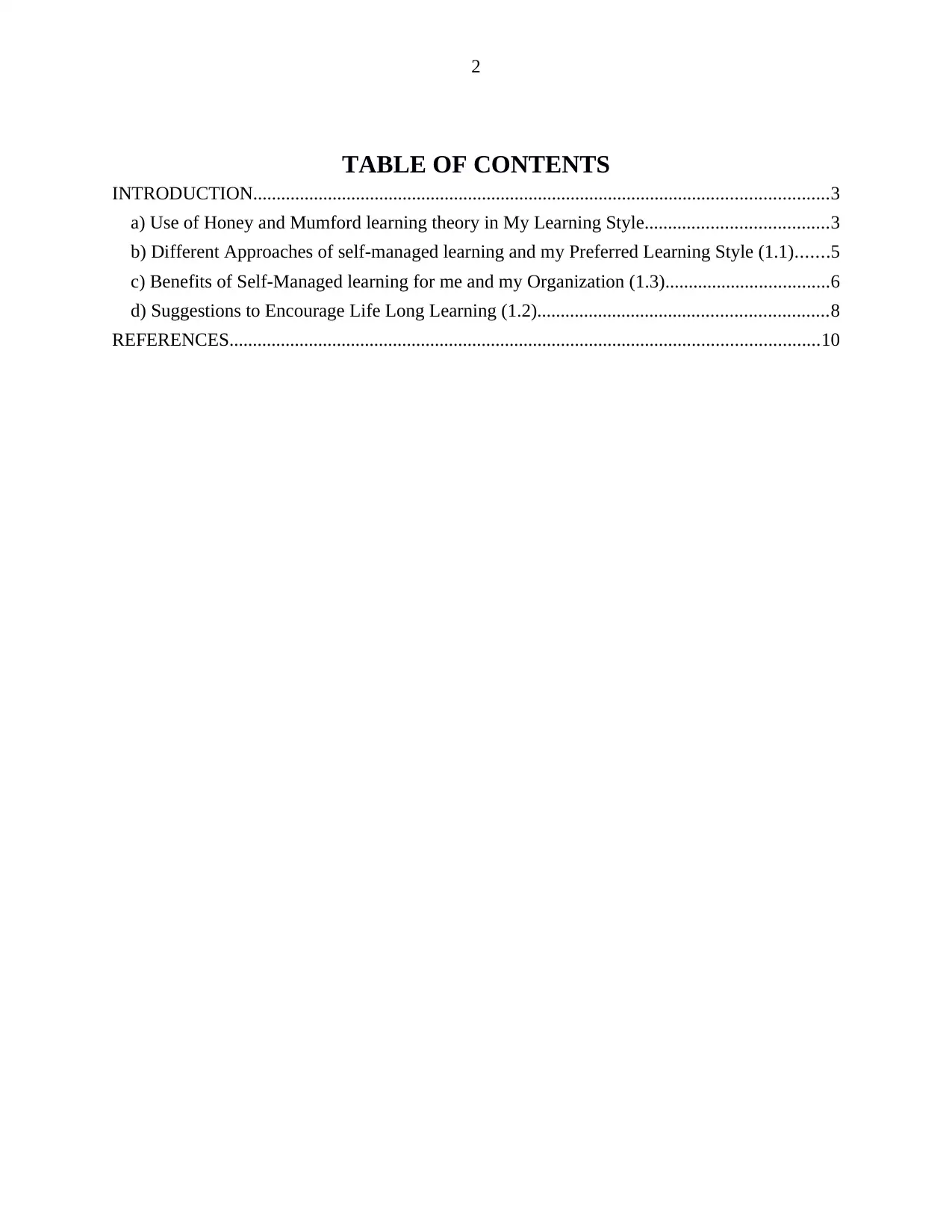
2
TABLE OF CONTENTS
INTRODUCTION...........................................................................................................................3
a) Use of Honey and Mumford learning theory in My Learning Style.......................................3
b) Different Approaches of self-managed learning and my Preferred Learning Style (1.1).......5
c) Benefits of Self-Managed learning for me and my Organization (1.3)...................................6
d) Suggestions to Encourage Life Long Learning (1.2)..............................................................8
REFERENCES..............................................................................................................................10
TABLE OF CONTENTS
INTRODUCTION...........................................................................................................................3
a) Use of Honey and Mumford learning theory in My Learning Style.......................................3
b) Different Approaches of self-managed learning and my Preferred Learning Style (1.1).......5
c) Benefits of Self-Managed learning for me and my Organization (1.3)...................................6
d) Suggestions to Encourage Life Long Learning (1.2)..............................................................8
REFERENCES..............................................................................................................................10
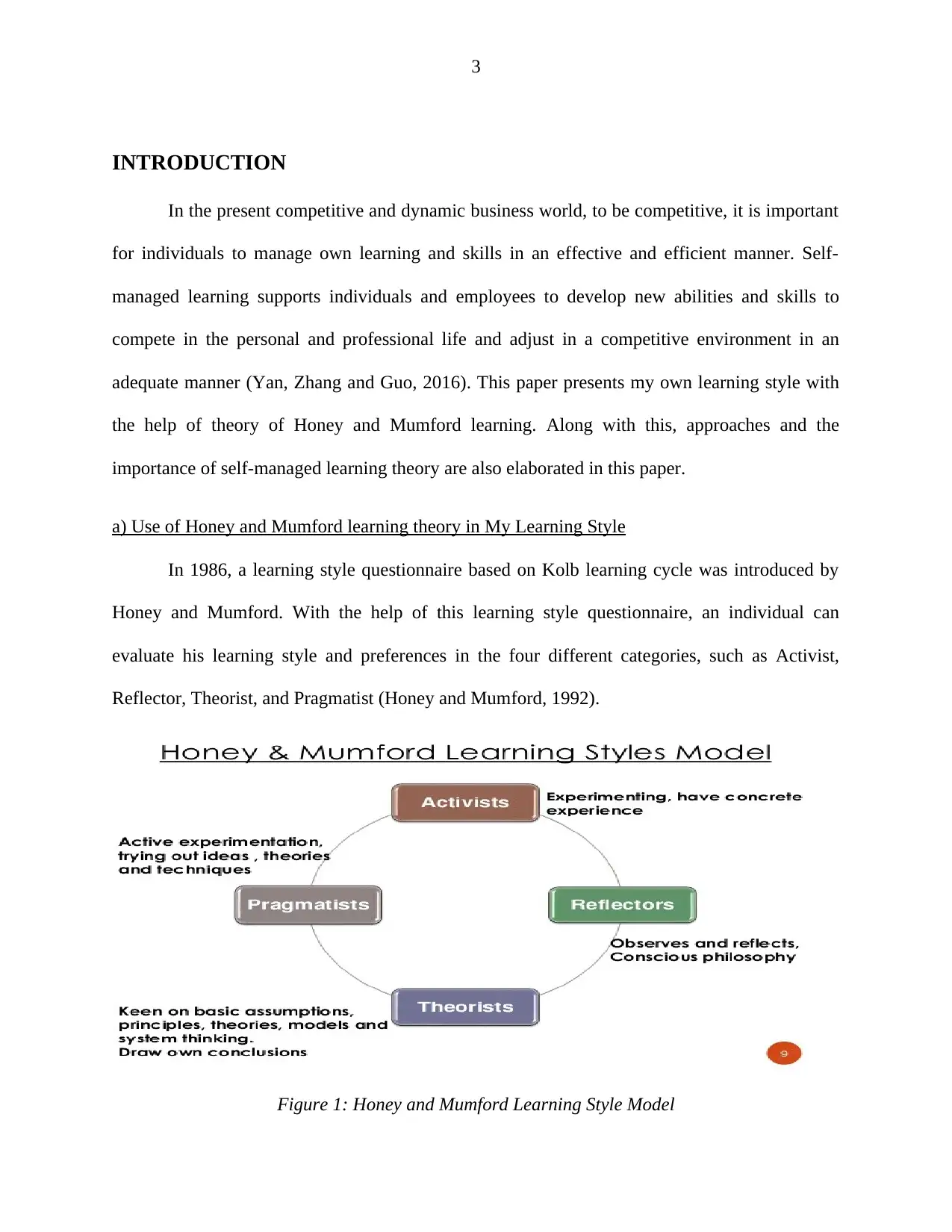
3
INTRODUCTION
In the present competitive and dynamic business world, to be competitive, it is important
for individuals to manage own learning and skills in an effective and efficient manner. Self-
managed learning supports individuals and employees to develop new abilities and skills to
compete in the personal and professional life and adjust in a competitive environment in an
adequate manner (Yan, Zhang and Guo, 2016). This paper presents my own learning style with
the help of theory of Honey and Mumford learning. Along with this, approaches and the
importance of self-managed learning theory are also elaborated in this paper.
a) Use of Honey and Mumford learning theory in My Learning Style
In 1986, a learning style questionnaire based on Kolb learning cycle was introduced by
Honey and Mumford. With the help of this learning style questionnaire, an individual can
evaluate his learning style and preferences in the four different categories, such as Activist,
Reflector, Theorist, and Pragmatist (Honey and Mumford, 1992).
Figure 1: Honey and Mumford Learning Style Model
INTRODUCTION
In the present competitive and dynamic business world, to be competitive, it is important
for individuals to manage own learning and skills in an effective and efficient manner. Self-
managed learning supports individuals and employees to develop new abilities and skills to
compete in the personal and professional life and adjust in a competitive environment in an
adequate manner (Yan, Zhang and Guo, 2016). This paper presents my own learning style with
the help of theory of Honey and Mumford learning. Along with this, approaches and the
importance of self-managed learning theory are also elaborated in this paper.
a) Use of Honey and Mumford learning theory in My Learning Style
In 1986, a learning style questionnaire based on Kolb learning cycle was introduced by
Honey and Mumford. With the help of this learning style questionnaire, an individual can
evaluate his learning style and preferences in the four different categories, such as Activist,
Reflector, Theorist, and Pragmatist (Honey and Mumford, 1992).
Figure 1: Honey and Mumford Learning Style Model
⊘ This is a preview!⊘
Do you want full access?
Subscribe today to unlock all pages.

Trusted by 1+ million students worldwide
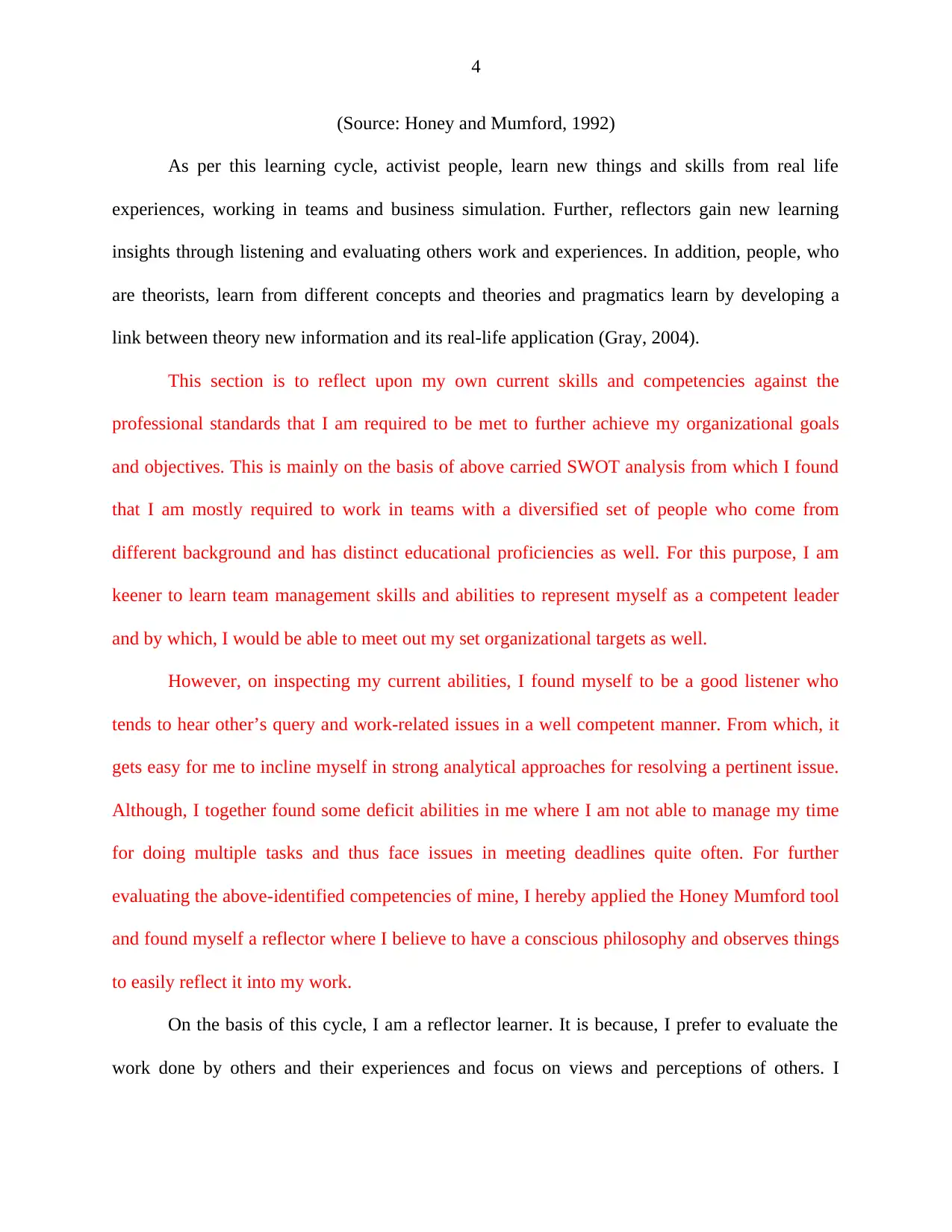
4
(Source: Honey and Mumford, 1992)
As per this learning cycle, activist people, learn new things and skills from real life
experiences, working in teams and business simulation. Further, reflectors gain new learning
insights through listening and evaluating others work and experiences. In addition, people, who
are theorists, learn from different concepts and theories and pragmatics learn by developing a
link between theory new information and its real-life application (Gray, 2004).
This section is to reflect upon my own current skills and competencies against the
professional standards that I am required to be met to further achieve my organizational goals
and objectives. This is mainly on the basis of above carried SWOT analysis from which I found
that I am mostly required to work in teams with a diversified set of people who come from
different background and has distinct educational proficiencies as well. For this purpose, I am
keener to learn team management skills and abilities to represent myself as a competent leader
and by which, I would be able to meet out my set organizational targets as well.
However, on inspecting my current abilities, I found myself to be a good listener who
tends to hear other’s query and work-related issues in a well competent manner. From which, it
gets easy for me to incline myself in strong analytical approaches for resolving a pertinent issue.
Although, I together found some deficit abilities in me where I am not able to manage my time
for doing multiple tasks and thus face issues in meeting deadlines quite often. For further
evaluating the above-identified competencies of mine, I hereby applied the Honey Mumford tool
and found myself a reflector where I believe to have a conscious philosophy and observes things
to easily reflect it into my work.
On the basis of this cycle, I am a reflector learner. It is because, I prefer to evaluate the
work done by others and their experiences and focus on views and perceptions of others. I
(Source: Honey and Mumford, 1992)
As per this learning cycle, activist people, learn new things and skills from real life
experiences, working in teams and business simulation. Further, reflectors gain new learning
insights through listening and evaluating others work and experiences. In addition, people, who
are theorists, learn from different concepts and theories and pragmatics learn by developing a
link between theory new information and its real-life application (Gray, 2004).
This section is to reflect upon my own current skills and competencies against the
professional standards that I am required to be met to further achieve my organizational goals
and objectives. This is mainly on the basis of above carried SWOT analysis from which I found
that I am mostly required to work in teams with a diversified set of people who come from
different background and has distinct educational proficiencies as well. For this purpose, I am
keener to learn team management skills and abilities to represent myself as a competent leader
and by which, I would be able to meet out my set organizational targets as well.
However, on inspecting my current abilities, I found myself to be a good listener who
tends to hear other’s query and work-related issues in a well competent manner. From which, it
gets easy for me to incline myself in strong analytical approaches for resolving a pertinent issue.
Although, I together found some deficit abilities in me where I am not able to manage my time
for doing multiple tasks and thus face issues in meeting deadlines quite often. For further
evaluating the above-identified competencies of mine, I hereby applied the Honey Mumford tool
and found myself a reflector where I believe to have a conscious philosophy and observes things
to easily reflect it into my work.
On the basis of this cycle, I am a reflector learner. It is because, I prefer to evaluate the
work done by others and their experiences and focus on views and perceptions of others. I
Paraphrase This Document
Need a fresh take? Get an instant paraphrase of this document with our AI Paraphraser
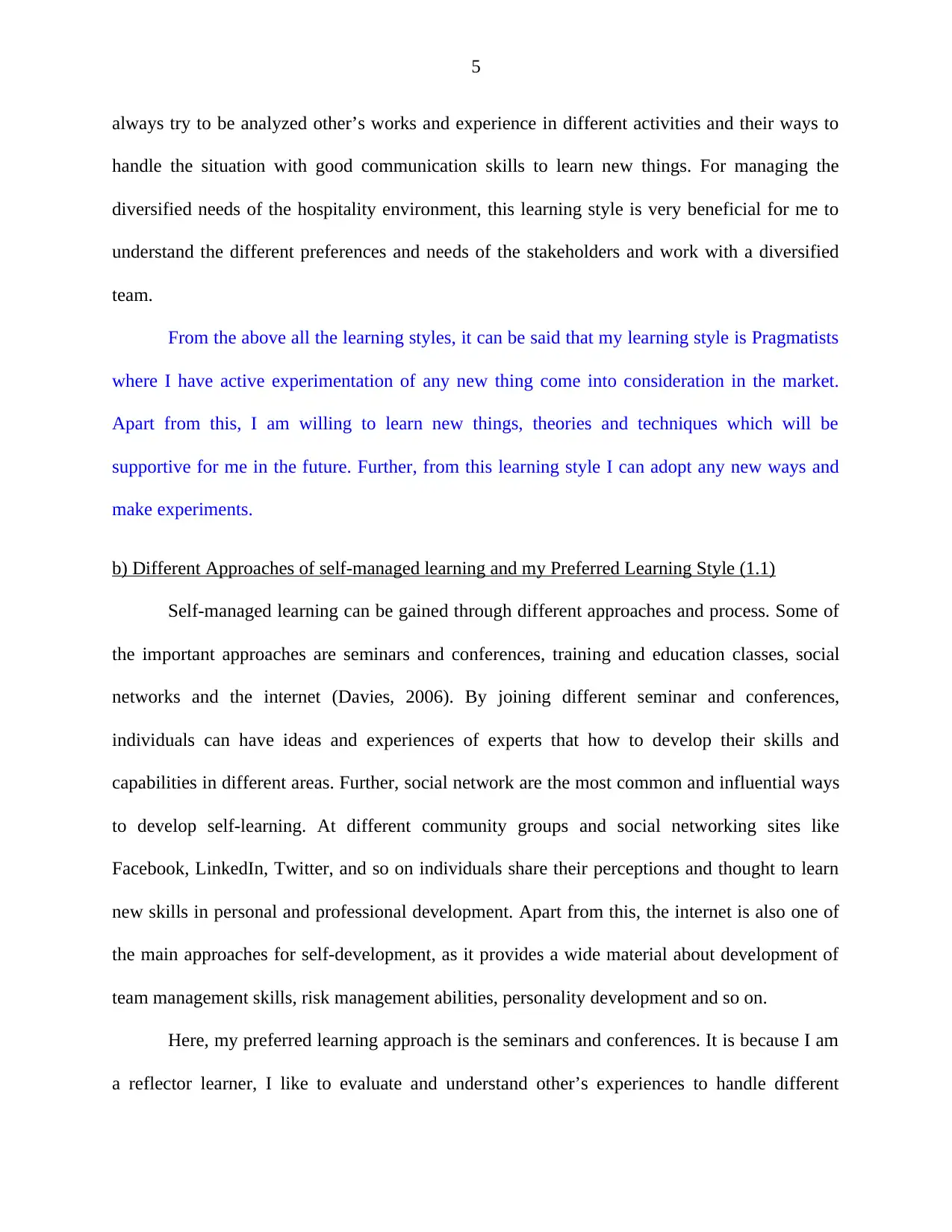
5
always try to be analyzed other’s works and experience in different activities and their ways to
handle the situation with good communication skills to learn new things. For managing the
diversified needs of the hospitality environment, this learning style is very beneficial for me to
understand the different preferences and needs of the stakeholders and work with a diversified
team.
From the above all the learning styles, it can be said that my learning style is Pragmatists
where I have active experimentation of any new thing come into consideration in the market.
Apart from this, I am willing to learn new things, theories and techniques which will be
supportive for me in the future. Further, from this learning style I can adopt any new ways and
make experiments.
b) Different Approaches of self-managed learning and my Preferred Learning Style (1.1)
Self-managed learning can be gained through different approaches and process. Some of
the important approaches are seminars and conferences, training and education classes, social
networks and the internet (Davies, 2006). By joining different seminar and conferences,
individuals can have ideas and experiences of experts that how to develop their skills and
capabilities in different areas. Further, social network are the most common and influential ways
to develop self-learning. At different community groups and social networking sites like
Facebook, LinkedIn, Twitter, and so on individuals share their perceptions and thought to learn
new skills in personal and professional development. Apart from this, the internet is also one of
the main approaches for self-development, as it provides a wide material about development of
team management skills, risk management abilities, personality development and so on.
Here, my preferred learning approach is the seminars and conferences. It is because I am
a reflector learner, I like to evaluate and understand other’s experiences to handle different
always try to be analyzed other’s works and experience in different activities and their ways to
handle the situation with good communication skills to learn new things. For managing the
diversified needs of the hospitality environment, this learning style is very beneficial for me to
understand the different preferences and needs of the stakeholders and work with a diversified
team.
From the above all the learning styles, it can be said that my learning style is Pragmatists
where I have active experimentation of any new thing come into consideration in the market.
Apart from this, I am willing to learn new things, theories and techniques which will be
supportive for me in the future. Further, from this learning style I can adopt any new ways and
make experiments.
b) Different Approaches of self-managed learning and my Preferred Learning Style (1.1)
Self-managed learning can be gained through different approaches and process. Some of
the important approaches are seminars and conferences, training and education classes, social
networks and the internet (Davies, 2006). By joining different seminar and conferences,
individuals can have ideas and experiences of experts that how to develop their skills and
capabilities in different areas. Further, social network are the most common and influential ways
to develop self-learning. At different community groups and social networking sites like
Facebook, LinkedIn, Twitter, and so on individuals share their perceptions and thought to learn
new skills in personal and professional development. Apart from this, the internet is also one of
the main approaches for self-development, as it provides a wide material about development of
team management skills, risk management abilities, personality development and so on.
Here, my preferred learning approach is the seminars and conferences. It is because I am
a reflector learner, I like to evaluate and understand other’s experiences to handle different
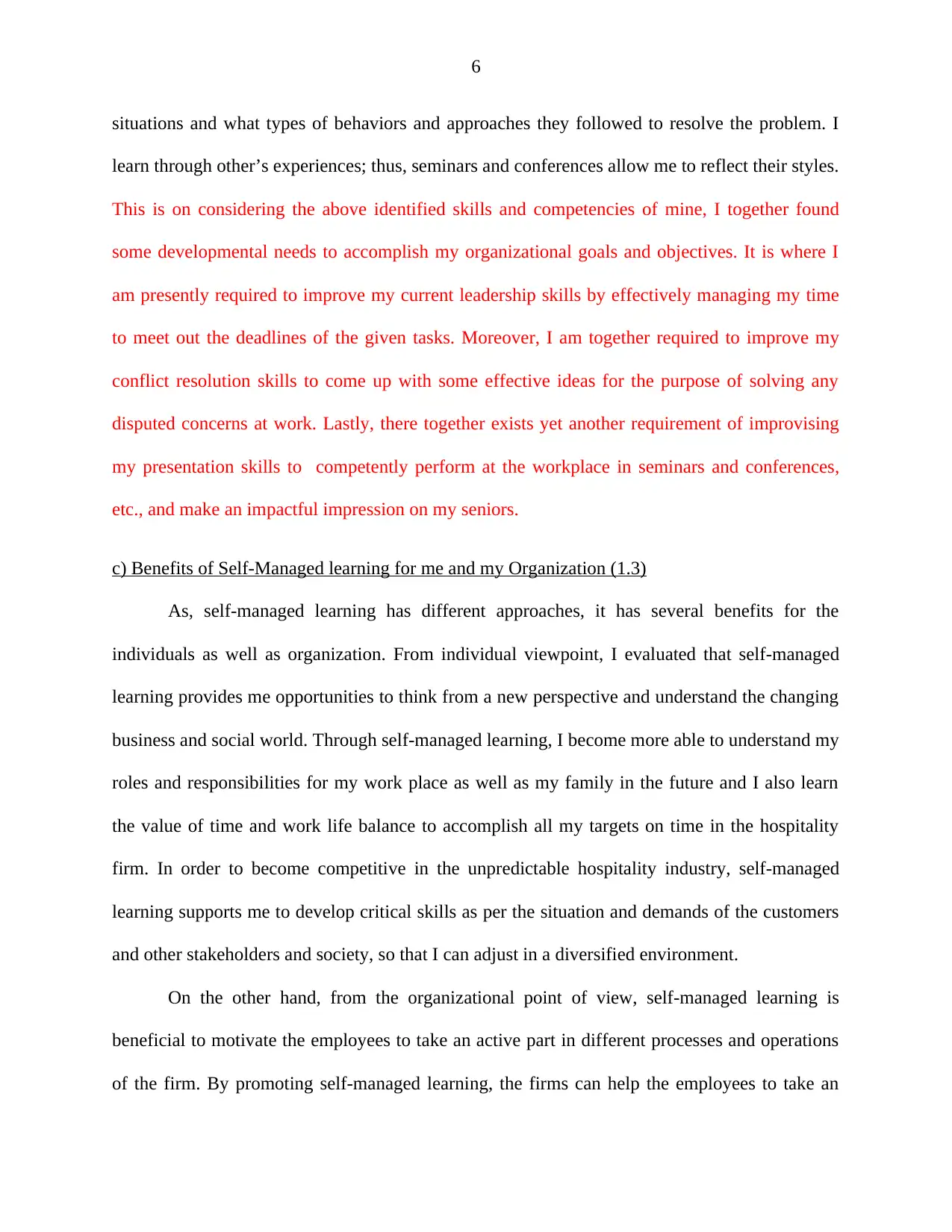
6
situations and what types of behaviors and approaches they followed to resolve the problem. I
learn through other’s experiences; thus, seminars and conferences allow me to reflect their styles.
This is on considering the above identified skills and competencies of mine, I together found
some developmental needs to accomplish my organizational goals and objectives. It is where I
am presently required to improve my current leadership skills by effectively managing my time
to meet out the deadlines of the given tasks. Moreover, I am together required to improve my
conflict resolution skills to come up with some effective ideas for the purpose of solving any
disputed concerns at work. Lastly, there together exists yet another requirement of improvising
my presentation skills to competently perform at the workplace in seminars and conferences,
etc., and make an impactful impression on my seniors.
c) Benefits of Self-Managed learning for me and my Organization (1.3)
As, self-managed learning has different approaches, it has several benefits for the
individuals as well as organization. From individual viewpoint, I evaluated that self-managed
learning provides me opportunities to think from a new perspective and understand the changing
business and social world. Through self-managed learning, I become more able to understand my
roles and responsibilities for my work place as well as my family in the future and I also learn
the value of time and work life balance to accomplish all my targets on time in the hospitality
firm. In order to become competitive in the unpredictable hospitality industry, self-managed
learning supports me to develop critical skills as per the situation and demands of the customers
and other stakeholders and society, so that I can adjust in a diversified environment.
On the other hand, from the organizational point of view, self-managed learning is
beneficial to motivate the employees to take an active part in different processes and operations
of the firm. By promoting self-managed learning, the firms can help the employees to take an
situations and what types of behaviors and approaches they followed to resolve the problem. I
learn through other’s experiences; thus, seminars and conferences allow me to reflect their styles.
This is on considering the above identified skills and competencies of mine, I together found
some developmental needs to accomplish my organizational goals and objectives. It is where I
am presently required to improve my current leadership skills by effectively managing my time
to meet out the deadlines of the given tasks. Moreover, I am together required to improve my
conflict resolution skills to come up with some effective ideas for the purpose of solving any
disputed concerns at work. Lastly, there together exists yet another requirement of improvising
my presentation skills to competently perform at the workplace in seminars and conferences,
etc., and make an impactful impression on my seniors.
c) Benefits of Self-Managed learning for me and my Organization (1.3)
As, self-managed learning has different approaches, it has several benefits for the
individuals as well as organization. From individual viewpoint, I evaluated that self-managed
learning provides me opportunities to think from a new perspective and understand the changing
business and social world. Through self-managed learning, I become more able to understand my
roles and responsibilities for my work place as well as my family in the future and I also learn
the value of time and work life balance to accomplish all my targets on time in the hospitality
firm. In order to become competitive in the unpredictable hospitality industry, self-managed
learning supports me to develop critical skills as per the situation and demands of the customers
and other stakeholders and society, so that I can adjust in a diversified environment.
On the other hand, from the organizational point of view, self-managed learning is
beneficial to motivate the employees to take an active part in different processes and operations
of the firm. By promoting self-managed learning, the firms can help the employees to take an
⊘ This is a preview!⊘
Do you want full access?
Subscribe today to unlock all pages.

Trusted by 1+ million students worldwide
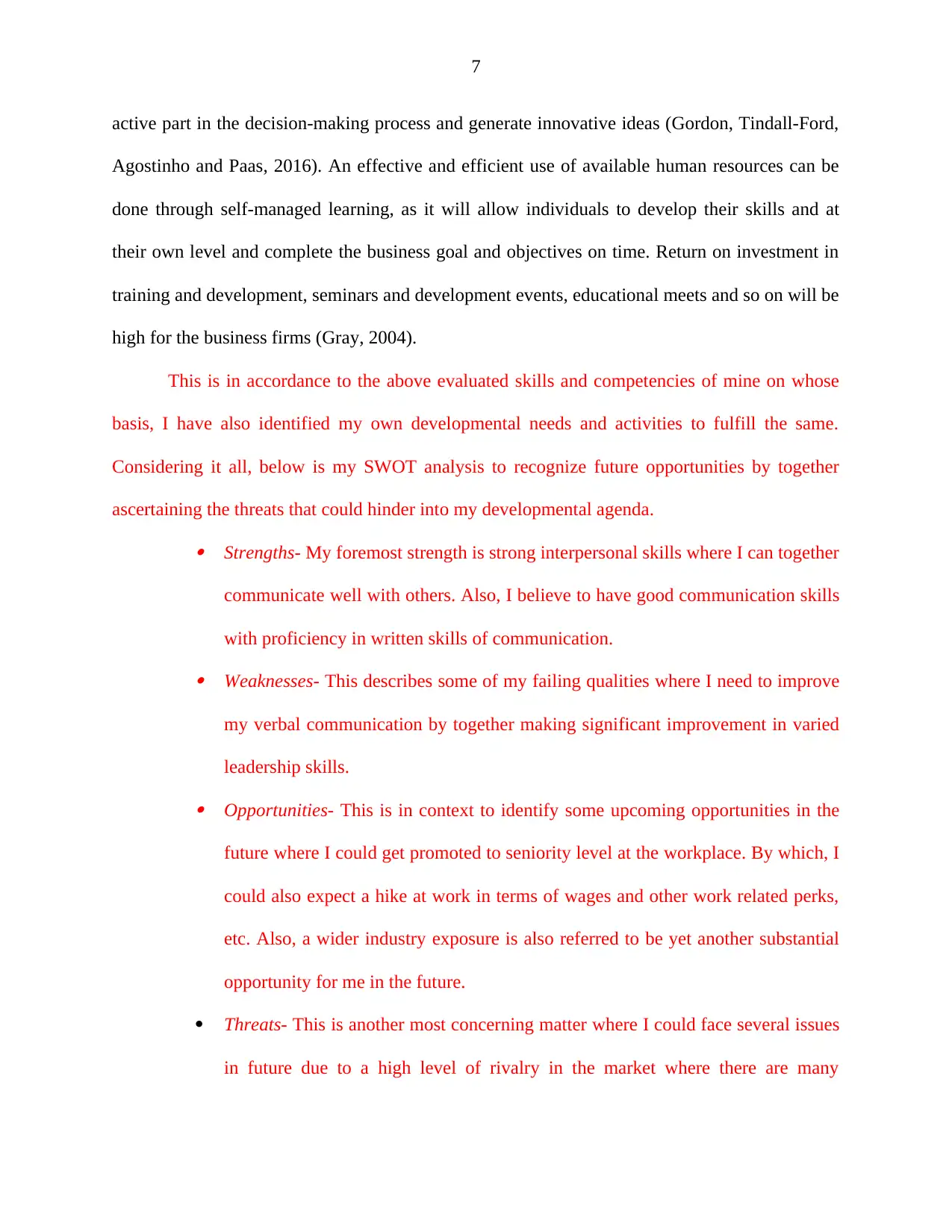
7
active part in the decision-making process and generate innovative ideas (Gordon, Tindall-Ford,
Agostinho and Paas, 2016). An effective and efficient use of available human resources can be
done through self-managed learning, as it will allow individuals to develop their skills and at
their own level and complete the business goal and objectives on time. Return on investment in
training and development, seminars and development events, educational meets and so on will be
high for the business firms (Gray, 2004).
This is in accordance to the above evaluated skills and competencies of mine on whose
basis, I have also identified my own developmental needs and activities to fulfill the same.
Considering it all, below is my SWOT analysis to recognize future opportunities by together
ascertaining the threats that could hinder into my developmental agenda.
Strengths- My foremost strength is strong interpersonal skills where I can together
communicate well with others. Also, I believe to have good communication skills
with proficiency in written skills of communication.
Weaknesses- This describes some of my failing qualities where I need to improve
my verbal communication by together making significant improvement in varied
leadership skills.
Opportunities- This is in context to identify some upcoming opportunities in the
future where I could get promoted to seniority level at the workplace. By which, I
could also expect a hike at work in terms of wages and other work related perks,
etc. Also, a wider industry exposure is also referred to be yet another substantial
opportunity for me in the future.
Threats- This is another most concerning matter where I could face several issues
in future due to a high level of rivalry in the market where there are many
active part in the decision-making process and generate innovative ideas (Gordon, Tindall-Ford,
Agostinho and Paas, 2016). An effective and efficient use of available human resources can be
done through self-managed learning, as it will allow individuals to develop their skills and at
their own level and complete the business goal and objectives on time. Return on investment in
training and development, seminars and development events, educational meets and so on will be
high for the business firms (Gray, 2004).
This is in accordance to the above evaluated skills and competencies of mine on whose
basis, I have also identified my own developmental needs and activities to fulfill the same.
Considering it all, below is my SWOT analysis to recognize future opportunities by together
ascertaining the threats that could hinder into my developmental agenda.
Strengths- My foremost strength is strong interpersonal skills where I can together
communicate well with others. Also, I believe to have good communication skills
with proficiency in written skills of communication.
Weaknesses- This describes some of my failing qualities where I need to improve
my verbal communication by together making significant improvement in varied
leadership skills.
Opportunities- This is in context to identify some upcoming opportunities in the
future where I could get promoted to seniority level at the workplace. By which, I
could also expect a hike at work in terms of wages and other work related perks,
etc. Also, a wider industry exposure is also referred to be yet another substantial
opportunity for me in the future.
Threats- This is another most concerning matter where I could face several issues
in future due to a high level of rivalry in the market where there are many
Paraphrase This Document
Need a fresh take? Get an instant paraphrase of this document with our AI Paraphraser
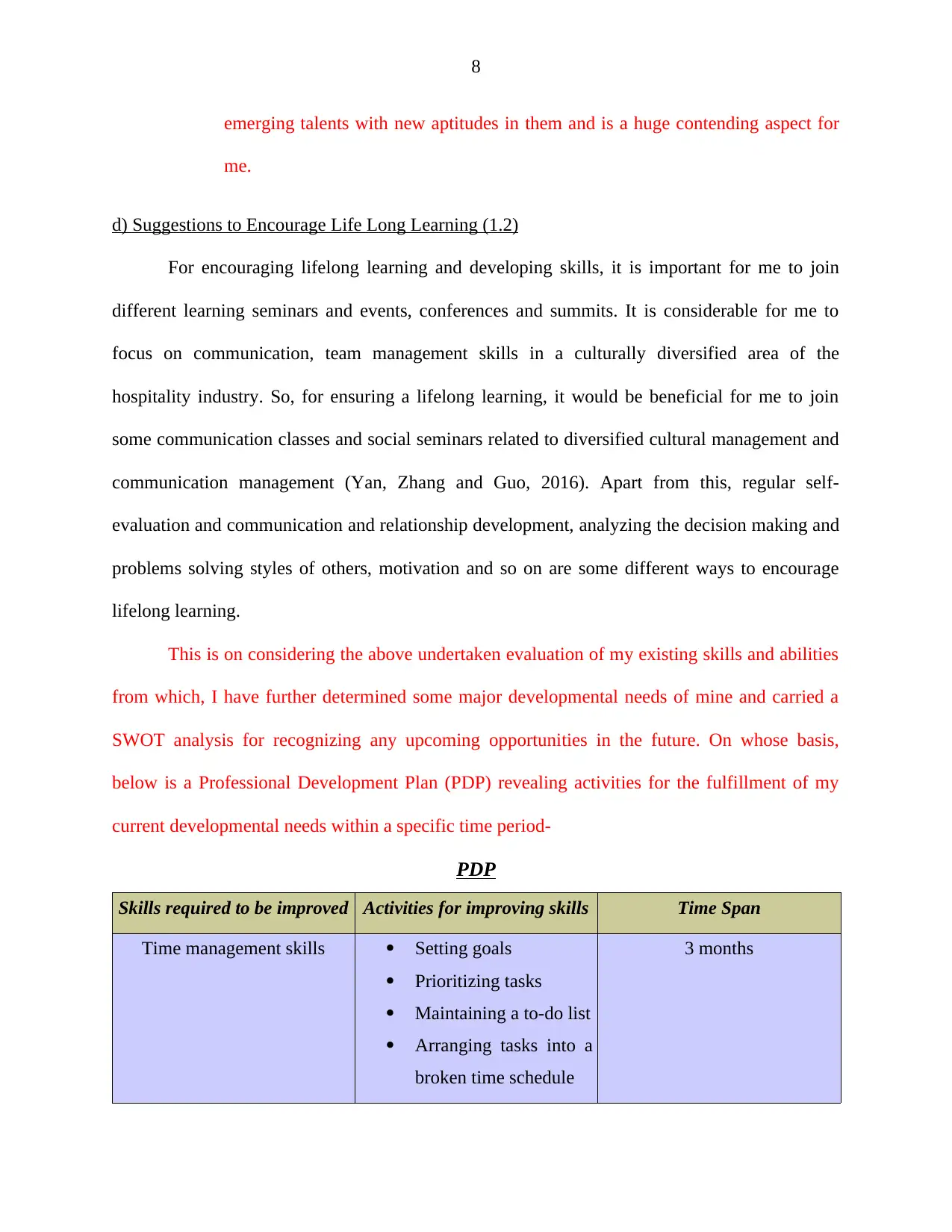
8
emerging talents with new aptitudes in them and is a huge contending aspect for
me.
d) Suggestions to Encourage Life Long Learning (1.2)
For encouraging lifelong learning and developing skills, it is important for me to join
different learning seminars and events, conferences and summits. It is considerable for me to
focus on communication, team management skills in a culturally diversified area of the
hospitality industry. So, for ensuring a lifelong learning, it would be beneficial for me to join
some communication classes and social seminars related to diversified cultural management and
communication management (Yan, Zhang and Guo, 2016). Apart from this, regular self-
evaluation and communication and relationship development, analyzing the decision making and
problems solving styles of others, motivation and so on are some different ways to encourage
lifelong learning.
This is on considering the above undertaken evaluation of my existing skills and abilities
from which, I have further determined some major developmental needs of mine and carried a
SWOT analysis for recognizing any upcoming opportunities in the future. On whose basis,
below is a Professional Development Plan (PDP) revealing activities for the fulfillment of my
current developmental needs within a specific time period-
PDP
Skills required to be improved Activities for improving skills Time Span
Time management skills Setting goals
Prioritizing tasks
Maintaining a to-do list
Arranging tasks into a
broken time schedule
3 months
emerging talents with new aptitudes in them and is a huge contending aspect for
me.
d) Suggestions to Encourage Life Long Learning (1.2)
For encouraging lifelong learning and developing skills, it is important for me to join
different learning seminars and events, conferences and summits. It is considerable for me to
focus on communication, team management skills in a culturally diversified area of the
hospitality industry. So, for ensuring a lifelong learning, it would be beneficial for me to join
some communication classes and social seminars related to diversified cultural management and
communication management (Yan, Zhang and Guo, 2016). Apart from this, regular self-
evaluation and communication and relationship development, analyzing the decision making and
problems solving styles of others, motivation and so on are some different ways to encourage
lifelong learning.
This is on considering the above undertaken evaluation of my existing skills and abilities
from which, I have further determined some major developmental needs of mine and carried a
SWOT analysis for recognizing any upcoming opportunities in the future. On whose basis,
below is a Professional Development Plan (PDP) revealing activities for the fulfillment of my
current developmental needs within a specific time period-
PDP
Skills required to be improved Activities for improving skills Time Span
Time management skills Setting goals
Prioritizing tasks
Maintaining a to-do list
Arranging tasks into a
broken time schedule
3 months
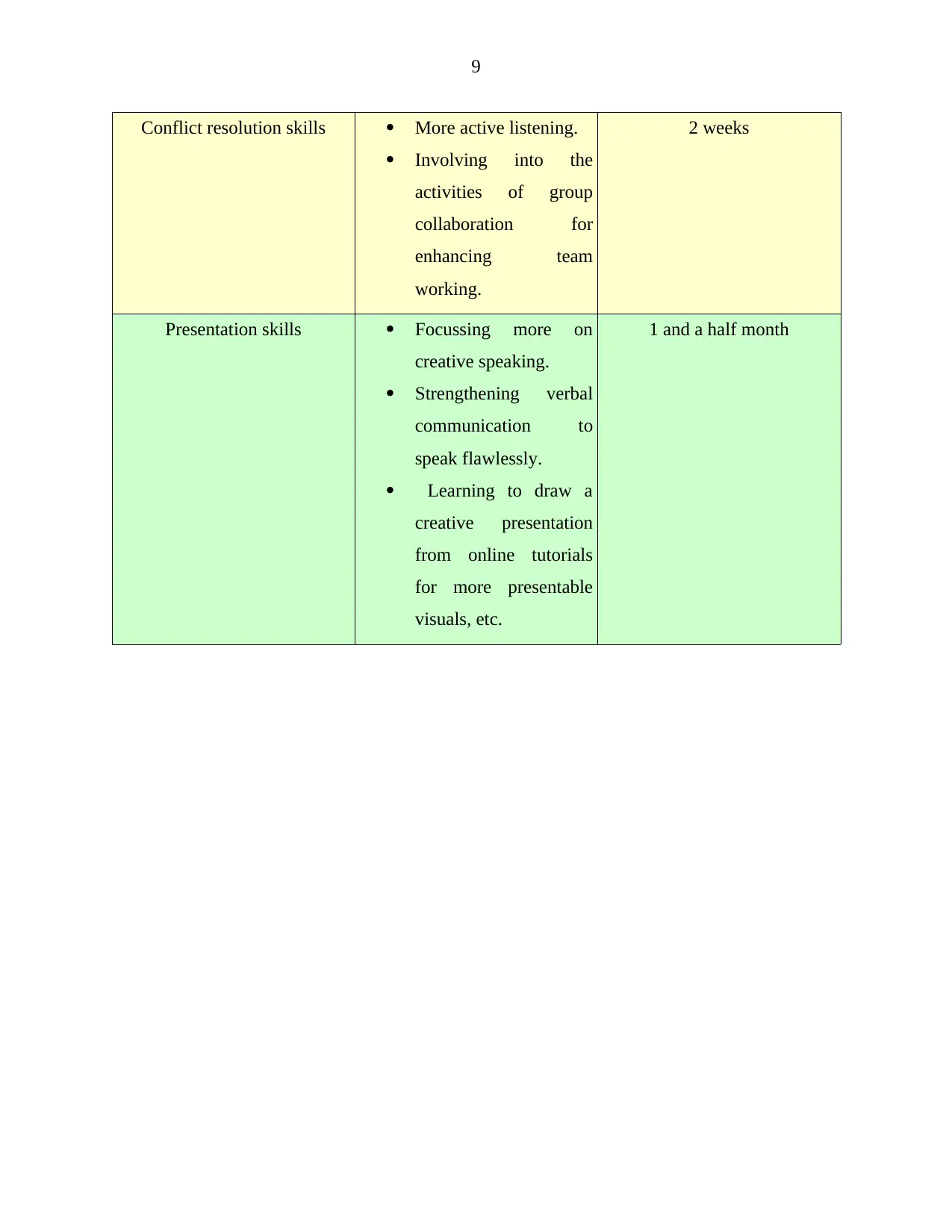
9
Conflict resolution skills More active listening.
Involving into the
activities of group
collaboration for
enhancing team
working.
2 weeks
Presentation skills Focussing more on
creative speaking.
Strengthening verbal
communication to
speak flawlessly.
Learning to draw a
creative presentation
from online tutorials
for more presentable
visuals, etc.
1 and a half month
Conflict resolution skills More active listening.
Involving into the
activities of group
collaboration for
enhancing team
working.
2 weeks
Presentation skills Focussing more on
creative speaking.
Strengthening verbal
communication to
speak flawlessly.
Learning to draw a
creative presentation
from online tutorials
for more presentable
visuals, etc.
1 and a half month
⊘ This is a preview!⊘
Do you want full access?
Subscribe today to unlock all pages.

Trusted by 1+ million students worldwide
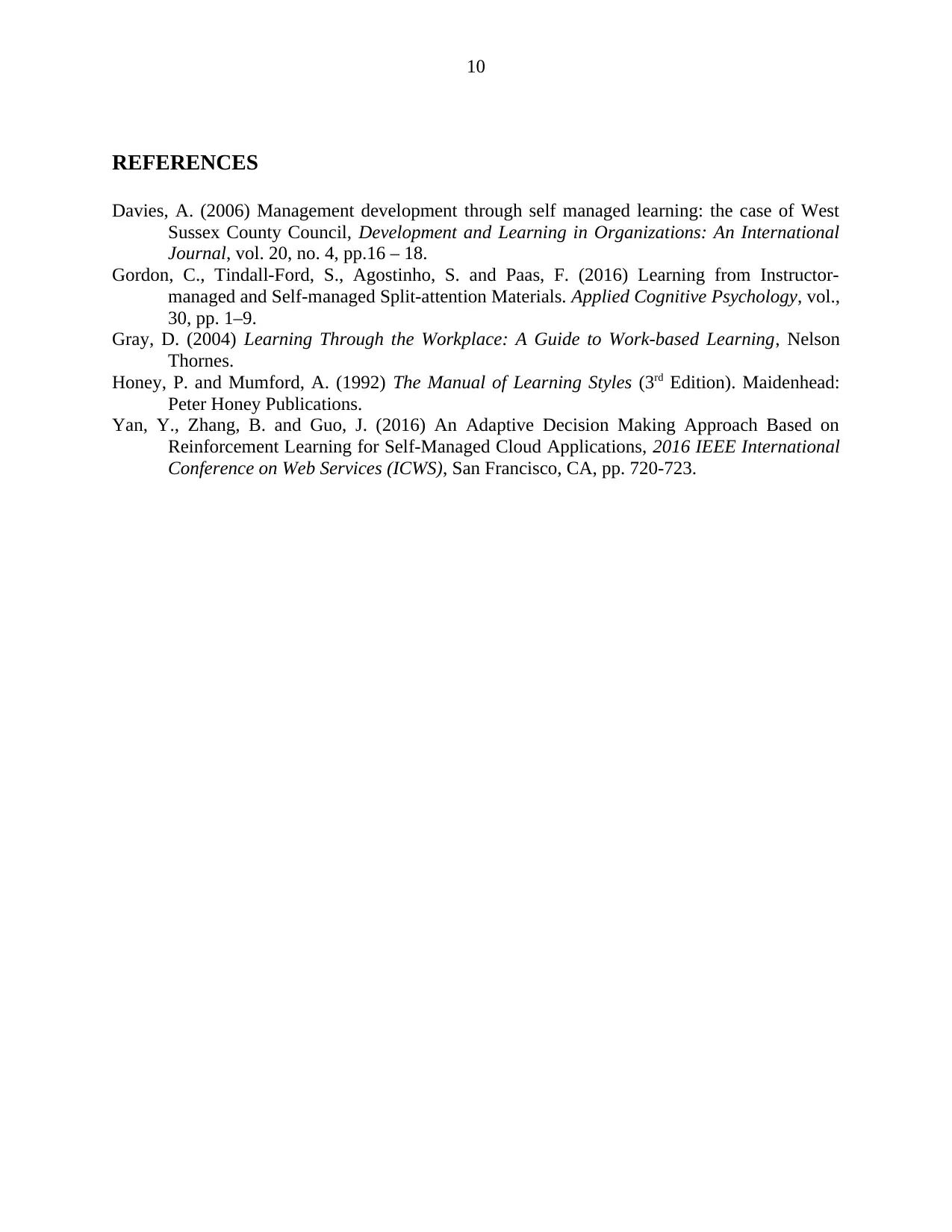
10
REFERENCES
Davies, A. (2006) Management development through self managed learning: the case of West
Sussex County Council, Development and Learning in Organizations: An International
Journal, vol. 20, no. 4, pp.16 – 18.
Gordon, C., Tindall-Ford, S., Agostinho, S. and Paas, F. (2016) Learning from Instructor-
managed and Self-managed Split-attention Materials. Applied Cognitive Psychology, vol.,
30, pp. 1–9.
Gray, D. (2004) Learning Through the Workplace: A Guide to Work-based Learning, Nelson
Thornes.
Honey, P. and Mumford, A. (1992) The Manual of Learning Styles (3rd Edition). Maidenhead:
Peter Honey Publications.
Yan, Y., Zhang, B. and Guo, J. (2016) An Adaptive Decision Making Approach Based on
Reinforcement Learning for Self-Managed Cloud Applications, 2016 IEEE International
Conference on Web Services (ICWS), San Francisco, CA, pp. 720-723.
REFERENCES
Davies, A. (2006) Management development through self managed learning: the case of West
Sussex County Council, Development and Learning in Organizations: An International
Journal, vol. 20, no. 4, pp.16 – 18.
Gordon, C., Tindall-Ford, S., Agostinho, S. and Paas, F. (2016) Learning from Instructor-
managed and Self-managed Split-attention Materials. Applied Cognitive Psychology, vol.,
30, pp. 1–9.
Gray, D. (2004) Learning Through the Workplace: A Guide to Work-based Learning, Nelson
Thornes.
Honey, P. and Mumford, A. (1992) The Manual of Learning Styles (3rd Edition). Maidenhead:
Peter Honey Publications.
Yan, Y., Zhang, B. and Guo, J. (2016) An Adaptive Decision Making Approach Based on
Reinforcement Learning for Self-Managed Cloud Applications, 2016 IEEE International
Conference on Web Services (ICWS), San Francisco, CA, pp. 720-723.
1 out of 10
Related Documents
Your All-in-One AI-Powered Toolkit for Academic Success.
+13062052269
info@desklib.com
Available 24*7 on WhatsApp / Email
![[object Object]](/_next/static/media/star-bottom.7253800d.svg)
Unlock your academic potential
Copyright © 2020–2026 A2Z Services. All Rights Reserved. Developed and managed by ZUCOL.





